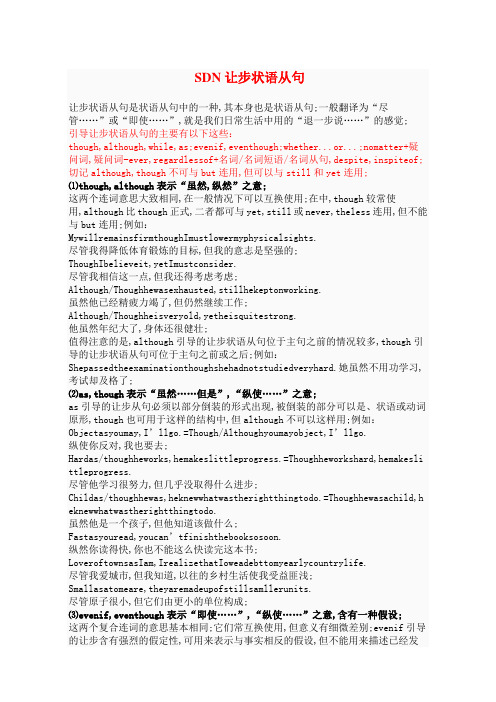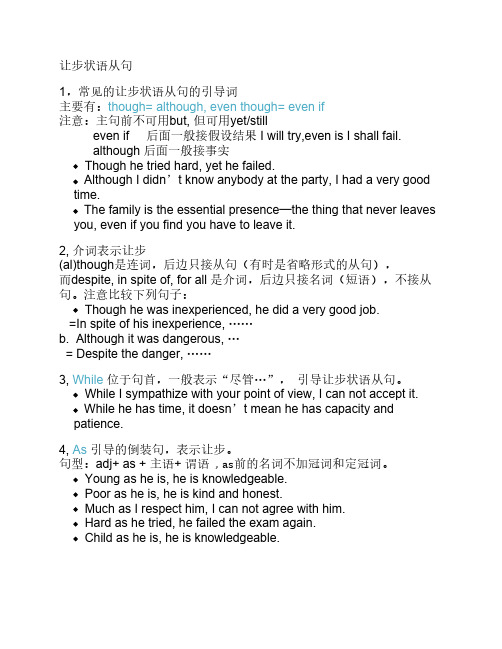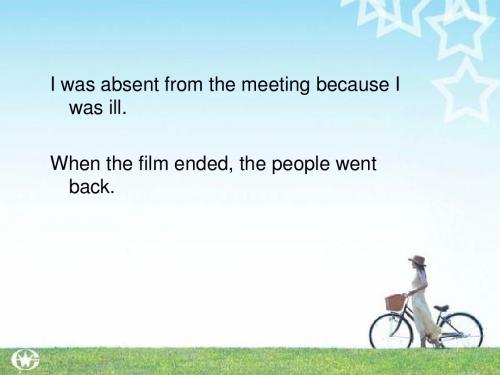让步状语从句
让步状语从句用法归纳

SDN让步状语从句让步状语从句是状语从句中的一种,其本身也是状语从句;一般翻译为“尽管……”或“即使……”,就是我们日常生活中用的“退一步说……”的感觉;引导让步状语从句的主要有以下这些:though,although,while,as;evenif,eventhough;whether...or...;nomatter+疑问词,疑问词-ever,regardlessof+名词/名词短语/名词从句,despite,inspiteof;切记although,though不可与but连用,但可以与still和yet连用;⑴though,although表示“虽然,纵然”之意;这两个连词意思大致相同,在一般情况下可以互换使用;在中,though较常使用,although比though正式,二者都可与yet,still或never,theless连用,但不能与but连用;例如:MywillremainsfirmthoughImustlowermyphysicalsights.尽管我得降低体育锻炼的目标,但我的意志是坚强的;ThoughIbelieveit,yetImustconsider.尽管我相信这一点,但我还得考虑考虑;Although/Thoughhewasexhausted,stillhekeptonworking.虽然他已经精疲力竭了,但仍然继续工作;Although/Thoughheisveryold,yetheisquitestrong.他虽然年纪大了,身体还很健壮;值得注意的是,although引导的让步状语从句位于主句之前的情况较多,though引导的让步状语从句可位于主句之前或之后;例如:Shepassedtheexaminationthoughshehadnotstudiedveryhard.她虽然不用功学习,考试却及格了;⑵as,though表示“虽然……但是”,“纵使……”之意;as引导的让步从句必须以部分倒装的形式出现,被倒装的部分可以是、状语或动词原形,though也可用于这样的结构中,但although不可以这样用;例如:Objectasyoumay,I’llgo.=Though/Althoughyoumayobject,I’llgo.纵使你反对,我也要去;Hardas/thoughheworks,hemakeslittleprogress.=Thoughheworkshard,hemakesli ttleprogress.尽管他学习很努力,但几乎没取得什么进步;Childas/thoughhewas,heknewwhatwastherightthingtodo.=Thoughhewasachild,h eknewwhatwastherightthingtodo.虽然他是一个孩子,但他知道该做什么;Fastasyouread,youcan’tfinishthebooksosoon.纵然你读得快,你也不能这么快读完这本书;LoveroftownsasIam,IrealizethatIoweadebttomyearlycountrylife.尽管我爱城市,但我知道,以往的乡村生活使我受益匪浅;Smallasatomeare,theyaremadeupofstillsamllerunits.尽管原子很小,但它们由更小的单位构成;⑶evenif,eventhough表示“即使……”,“纵使……”之意,含有一种假设;这两个复合连词的意思基本相同;它们常互换使用,但意义有细微差别;evenif引导的让步含有强烈的假定性,可用来表示与事实相反的假设,但不能用来描述已经发生的事实;而eventhough引导让步状语从句时,是以从句的内容为先决条件的,即说话人肯定了从句的事实,表示已经发生了的事;例如:We’llmakeatripevenif/thoughtheweatherisbad.即使天气不好,我们也要作一次旅行;Evenifheispoor,sheloveshim.=Hemaybepoor,yetsheloveshim.即使他很穷,但她还是爱他;Eventhoughheispoor,sheloveshim.=Heispoor,yetsheloveshim.尽管他很穷,但她还是爱他; Heseemedyouthfuleventhoughhewasanoldman.尽管他已经是老年人,但看上去仍然是朝气蓬勃的;Youmustcomeinifit'sonlyaminute.你一定要进来,哪怕就一分钟呢;⑷whether...or...表示“不论是否……”,“不管是……还是……”之意;由这一个复合连词引导的让步状语从句旨在说明正反两方面的可能性都不会影响主句的意向或结果,所以它的语气是比较强烈的,从而也更加坚定了主句的内容;例如:You'llhavetoattendtheceremonywhetheryou'refreeorbusy.不管你忙不忙,都要参加这个典礼;Whetheryoubelieveitornot,it'strue.无论你是否相信,这都是真的; Whetherornottheywinthisbattle,theywon'twinthewar.不管他们是否能赢得这次战役,他们绝不会赢得这场战争;1⑸“nomatter+疑问词”或“疑问词-ever”的含义为“……都……;不管……都……”它们引导的让步状语从句可以互换;例如:Nomatterwhathappened,hewouldnotmind.=Whateverhappened,hewouldnotmind.无论发生了什么事情,他都不会介意的;Nomatterwhoyouare,youmustkeepthelaw.=Whoeveryouare,youmustkeepthelaw.不管你是谁,你都需要遵纪守法;Whenanyonedoessomethingforyou,nomatterhowsmallandnomatterwhetherhe'sasu periororservant,it'spropertosay“Thankyou”.只要任何人替你做了一件事,不管事情多么微不足道,也不管他是你的上司还是你的仆人,你都应该说声“谢谢”;但“nomatter+疑问词”结构只能引导让步状语从句,而“疑问词-ever”还可以引导;例如:Whatever=Nomatterwhatyousay,Iwon’tbelieveyou.Whatever引导让步状语句无论你说什么,我都不会相信你;I'lleatwhatever≠no matterwhatyougiveme.whatever引导你给我吃什么,我就吃什么;Whoevercomeswillbewelcome.Whoever引导不管谁来都受到欢迎;此外,有时while也可以引导让步状语从句,但一般要位于句首;例如:WhileIlikethecolour,Idon'tliketheshape.我虽然喜欢那颜色,但不喜欢那形状;综上所述,我们可以看出,学习让步状语从句的关键是关联词的选用;其次,要注意的是由as引导的让步状语从句要用倒装语序;让步状语从句表示:虽然,尽管,即使等概念,由although,though尽管,即使,however无论怎样,whatever无论什么,whoever无论谁,whomever无论谁,whichever无论哪个,whenever无论何时,wherever无论哪里,whether是否,nomatterwho,what,where,when,etc无论……,evenif即使,eventhough即使等词引导;如:Wewon’tbediscouragedevenif=eventhoughwefailtentimes.我们就是失败十次也不泄气;Itwasanexcitinggame,though/althoughnogoalswerescored.那是一场精彩的球赛,尽管一个球都没进;though,although不能与but连用Whetheryoubelieveitornot,it’strue.不管你信不信,这是真的;However=Nomatterhowexpensiveitmaybe,I’lltakeit.无论它有多贵,我也要买下它;Don’tletthemin,whoever=nomatterwho theyare.不管他们是谁,别让他们进来;NomatterwhatIsayorhowIsayit,healwaysthinksI’mwrong.无论我说什么或怎么说,他总认为是我错;语法小贴士whatwho,which,when,etc.与whateverwhoever,whichever,whenever,etc.的区别:当引导让步状语从句时,两者相同,可以互换,但当引导名词性从句主语从句,宾语从句,和同位语从句时则只能用whateverwhoever,whichever,whenever,etc;如上面最后两个例句可改为:Howeverpurethewaterlooks,Idonotwanttodrinkit.IwanttomarrythemanIlove,nomatterwhohemaybe.下面句子不能用nomatter结构nomatter不能引导名词性从句:Whoevercomesbackfirstissupposedtowintheprize.主语从句Iamreadytodowhateveryouwantmeto.宾语从句例证:Whateveryoudid,Iwillaccept.为让步状语从句.Iwillacceptwhateveryoudid.为宾语从句.引导让步状语从句的用法引导让步状语从句时,as意为“虽然,尽管”,通常从句要倒装,倒装的方法是将从句的表语或状语放在as之前,而用though引导让步状语从句时句字则不必倒装口语中也可倒装;或Youngthoughheis,he….他虽然年轻,但懂得很多;though也有这种用法,可以替换as,但although没有这种用法注意,名词提句首时,不加冠词::teacherasheis,helikesChineseverymuchteacher前不加a或the;though还可以用作,放在句末;如:Itwashardwork;;Ienjoyedit,though=Itwashardwork,butIenjoyedit.那工作很苦,但是我喜欢干;3.用though/although,as引导让步状语从句时,句中不能用but表示转折语气;不能说:Thoughhelooksweak,butheishealthy.而要说:Thoughhelooksweak,heishealthy.或者说:Helooksweak,butheishealthy.我自己认为让步就是存在一定条件下的说法.用作副词,不可连接句子;但可置于第二句的句首、句末或句中;要特别注意的使用;eg:Aliceisagoodstudent.However,shehasoneshortcoming.爱丽丝是一个很好的学生,但她仍有缺点;,however,除以上提到的从句连词外,表示让步的介词短语有despite,inspiteof,后接名词;,wecannotignoretheadvantagesoflearningthroughinternet.though和although引导让步状语从句时,不可以与but连用;汉语中用"虽然……但是……”,但英语中只用though,although或but即可;although/thoughheisveryold,hestillworksveryhard.=heisveryold,hestillwor ksveryhard虽然他老了,但他仍然很努力地工作;不可说:although/thoughheisveryold,buthestillworksveryhard;though和although可以与yet连用;此处yet虽与but同义,但它不是连词,而是副词;thoughlknewthefact,yetldidntsayanything;尽管我知道,但我什么都没说;。
让步状语从句

让步状语从句1,常见的让步状语从句的引导词主要有:though= although, even though= even if注意:主句前不可用but, 但可用yet/stilleven if 后面一般接假设结果 I will try,even is I shall fail.although 后面一般接事实Though he tried hard, yet he failed.Although I didn’t know anybody at the party, I had a very good time.The family is the essential presence—the thing that never leaves you, even if you find you have to leave it.2, 介词表示让步(al)though是连词,后边只接从句(有时是省略形式的从句),而despite, in spite of, for all 是介词,后边只接名词(短语),不接从句。
注意比较下列句子:Though he was inexperienced, he did a very good job.=In spite of his inexperience, ……b. Although it was dangerous, …= Despite the danger, ……3, While 位于句首,一般表示“尽管…”, 引导让步状语从句。
While I sympathize with your point of view, I can not accept it.While he has time, it doesn’t mean he has capacity andpatience.4, As引导的倒装句,表示让步。
句型:adj+ as + 主语+ 谓语 ,as前的名词不加冠词和定冠词。
让步状语从句

No matter where No matter how
*no matter+wh-与wh-ever有何区别
1.引导让步状语从句,no matter what/when/where/who/which/how就相当于 whatever,whenever,wherever,whoever,whichever和however,表示“无论什么/ 无论何处/无论谁/无论哪一个/无论如何”。 e.g.No matter who/whoever you are ,you are to obey the law. 2. no matter+wh-只能引导让步状语从句,不能引导名词性从句。 3. wh-ever结构中:whenever,wherever和however只能引导让步状语从句;而 whatever, whoever和whichever除了可以引导让步状语从句外,还可以引导名词 性从句。 e.g.①Whenever she sees anyone in trouble,she will help him without hesitation.(让步状语从句) ②Whatever happens ,he manages to stay calm.(让步状语从句) ③Whatever is worth doing is worth doing well.(名词性从句) 4.引导让步状语从句时,whatever和no matter what后可接名词,however和no matter how 后接形容词或副词。 e.g. Whatever/No matter what(difficulties)I meet with,I won’t give up. No matter how/ However diffcult the problem is ,I won’t give up.
引导让步状语从句的词

引导让步状语从句的词1、though, although表示“虽然,纵然”之意这两个连词意思大致相同,在通常情况下可以交换采用。
在口语中,though较常采用,although比though正式宣布,二者都可以与yet,still或nevertheless属格,但无法与but属格。
比如:i will remains firm though i must lower my physical sights.尽管我得降低体育(锻炼)的目标,但我的意志是坚强的。
though i believe it,yet i must consider.尽管我坚信这一点,但我还得考量考量。
although/though he was exhausted,(still) he kept on working.虽然他已经精疲力竭了,但仍然继续工作。
although/though he is very old,(yet) he is quite strong.他虽然年纪小了,身体还很强壮。
值得注意的是,although引导的让步状语从句位于主句之前的情况较多,though引导的让步状语从句可位于主句之前或主句之后。
例如:she passed the examination though she had not studied very hard. 她虽然不用功自学,考试却不及格了。
2、as(though)则表示“虽然…但是”,“纵使…”之意as引导的让步状语从句必须以部分倒装的形式出现,被倒装的部分可以是表语、状语或动词原形,though也可用于这样的结构中,但although不可以这样用。
例如:o bject as/though you may, i’ll go.(=though/although you may object, i’ll go.)纵使你反对,我也必须回去。
hard as/ though he works,he makes little progress. (=though he workshard,he makes little progress.)尽管他学习很努力,但几乎没取得什么进步。
whether让步状语从句

whether让步状语从句Whether让步状语从句是英语语法中的一个重要部分,它可以用来表达一种让步的关系,即尽管某种情况存在,但是另一种情况仍然可能发生。
在本文中,我们将探讨一些常见的whether让步状语从句,并且解释它们的用法和意义。
1. Whether you like it or not, you have to study for the exam.这个句子中的whether让步状语从句表达了一种让步的关系,即尽管你不喜欢学习,但是你仍然必须为考试做准备。
2. Whether it rains or not, we are going to the beach.这个句子中的whether让步状语从句表达了一种让步的关系,即尽管天气可能不好,但是我们仍然打算去海滩。
3. Whether you believe it or not, the earth is round.这个句子中的whether让步状语从句表达了一种让步的关系,即尽管你可能不相信,但是地球确实是圆的。
4. Whether he is guilty or not, he deserves a fair trial.这个句子中的whether让步状语从句表达了一种让步的关系,即尽管他可能有罪,但是他仍然应该得到公正的审判。
5. Whether you like spicy food or not, this dish is delicious.这个句子中的whether让步状语从句表达了一种让步的关系,即尽管你可能不喜欢辣食,但是这道菜确实很美味。
6. Whether you agree with me or not, I think we should take action.这个句子中的whether让步状语从句表达了一种让步的关系,即尽管你可能不同意我的观点,但是我认为我们应该采取行动。
7. Whether you are ready or not, the meeting starts in five minutes.这个句子中的whether让步状语从句表达了一种让步的关系,即尽管你可能还没有准备好,但是会议将在五分钟内开始。
让步状语从句

2) as —— 尽管
as 引导让步状语从句时,要用倒装结构。
adj./n./ adv./v.放句首+as+陈述语序
虽然他很聪明,但是他不努力学习。 Although he is clever, he doesn't study hard. Clever as he is, he doesn't study hard.
4) 疑问词+ever =no matter + 疑问词 无论…
however(无论怎样), whatever(无论什么), whoever(无论谁), whomever(无论谁), whichever(无论哪个), whenever(无论何 时), wherever(无论哪里)
4) 疑问词+ever =no matter + 疑问词 无论…
Even though/if I didn’t understand what he said, I kept smiling. I won't go to the party even though/if I am invited. 即使你这么说,我也不相信。 Even though/if you say so, I don’t believe it.
A. even C. as if B. even though D. when
2. The old tower must be saved, ______the cost.
A. however C. whichever B. whatever D. wherever
3. He tried his best to solve the problem, ___ difficult it was. A.however C. whatever B. no matter D although
主将从现时间让步状语从句
主将从现时间让步状语从句
主将从现时间让步状语从句是一个复合句结构,在主句中,主语是主将,谓语是从现时间让步状语从句。
从现时间让步状语从句表示主将从现在的时间点开始,进行了某种动作或状态,虽然有一定的困难或限制,但还是按照计划或决定进行。
以下是符合题目要求的10个例子:
1. 虽然天气很冷,主将还是坚持每天早起晨跑。
2. 尽管时间紧迫,主将还是努力完成了任务。
3. 虽然路途遥远,主将仍然决定徒步穿越整个国家。
4. 尽管经济困难,主将依然坚持捐款帮助需要的人。
5. 虽然工作繁忙,主将还是抽出时间陪伴家人。
6. 尽管面临困难和挑战,主将不放弃追求自己的梦想。
7. 虽然身体疲惫,主将仍然坚持参加每周一次的羽毛球训练。
8. 尽管遭遇失败,主将没有失去信心,继续努力实现目标。
9. 虽然面临巨大的压力,主将仍然保持冷静,并做出了正确的决策。
10. 尽管遭遇了一系列的挫折,主将依然不放弃追求幸福和成功的努力。
以上例子展示了主将从现时间让步状语从句的用法,通过从句表达了主将在面临困难或限制的情况下仍然坚持或决定做某事的态度和行动。
这些例子中的主将可以是一个人,也可以是一个团体或组织。
通过这种句式的使用,可以强调主将的坚定意志和决心,展示他们
克服困难的能力和毅力。
让步状语从句大总结(汇总3篇)
让步状语从句大总结第1篇这些词在意思上和用法上都等于no matter how/ what等Whatever happens may happen, we shall never lose hope.无论发生什么,我们都不要失去信心。
(有时从句中的动词与may连用)However (=No matter how) expensive it may be, I'll take it.无论它有多贵,我也要买下它。
Don't let them in, whoever (=no matter who) they are.不管他们是谁,别让他们进来。
让步状语从句大总结第2篇if 有时也可用于让步状语从句,相当于even if。
If he is poor, he is at least honest.尽管他穷,但至少他很诚实。
We'll go if it rains.即使下雨我们也要去。
I'll do it if I die in the attempt.即使会丧命我也要试一下。
注意:有些时间、地点、条件、方式或让步等状语从句中,如果谓语含有动词be,主语又和主句中的主语一致,或者主语是it,常把从句中的主语和谓语的一部分(特别是动词be )省略掉。
Look out for cars when crossing the street.过街时当心车辆。
(= when you are crossing the street)She hurriedly left the room as though angry.她急匆匆地走出屋去,好象很生气的样子。
(= as though/if she was were angry)If possible, I'd like to have two copies of it.可能的话,我想要两本。
(= if it is possible,)She advised me not o say anything unless asked.她劝我别说什么,除非有人要我说。
让步状语从句的讲解与用法
让步状语从句是状语从句中的一种,其本身也是状语从句;一般翻译为“尽管……”或“即使……”,就是我们日常生活中用的“退一步说……”的感觉;使用的连词引导让步状语从句的连词主要有以下这些:though, although,while, as; even if, even though; whether...or...; no matter+疑问词,疑问词-ever,regardless of+名词/名词短语/名词从句,despite,in spite of;切记although不可与but连用用法1though, although表示“虽然,纵然”之意; 这两个连词意思大致相同,在一般情况下可以互换使用;在口语中,though较常使用,although比though正式,二者都可与yet, still或never,the less连用,但不能与but连用;例如:Although/Though he was exhausted, still he kept on working. 虽然他已经精疲力竭了,但仍然继续工作;2as, though表示“虽然……但是”,“纵使……”之意; as引导的让步状语从句必须以部分倒装的形式出现,被倒装的部分可以是表语、状语或动词原形,though也可用于这样的结构中,但although不可以这样用;例如:Object as you may, I’ll go.=Though/Although you may object, I’ll go. 纵使你反对,我也要去;3even if, even though 表示“即使……”,“纵使……”之意,含有一种假设; 这两个复合连词的意思基本相同;它们常互换使用,但意义有细微差别;even if引导的让步从句含有强烈的假定性,可用来表示与事实相反的假设,但不能用来描述已经发生的事实;而even though引导让步状语从句时,是以从句的内容为先决条件的,即说话人肯定了从句的事实,表示已经发生了的事;例如:We’ll make a trip even if/though the weather is bad. 即使天气不好,我们也要作一次旅行;4whether...or...表示“不论是否……”,“不管是……还是……”之意; 由这一个复合连词引导的让步状语从句旨在说明正反两方面的可能性都不会影响主句的意向或结果;例如:You'll have to attend the ceremony whether you're free or busy. 不管你忙不忙,都要参加这个典礼;Whether you believe it or not, it's true.无论你是否相信,这都是真的;5“no matter+疑问词”或“疑问词-ever”的含义为“……都……;不管……都……”它们引导的让步状语从句可以互换;例如:No matter what happened, he would not mind. =Whatever happened, he would not mind.无论发生了什么,他都不会介意的; No matter who you are, you must keep the law.=Whoever you are, you must keep the law.不管你是谁,你都要遵纪守法; 但“no matter+疑问词”结构只能引导让步状语从句,而“疑问词-ever”还可以引导名词性从句;例如:Whateve r =No matter what you say, I won’t believe you. Whatever 引导让步状语从句无论你说什么,我都不会相信你;I'll eat whatever ≠no matter what you give me. whatever引导宾语从句你给我吃什么,我就吃什么;Whoever comes will be welcome. Whoever 引导主语从句不管谁来都受到欢迎;此外,有时while也可以引导让步状语从句,但一般要位于句首;例如:While I like the colour, I don't like the shape.我虽然喜欢那颜色,但不喜欢那形状;综上所述,我们可以看出,学习让步状语从句的关键是关联词的选用;其次,要注意的是由as引导的让步状语从句要用倒装语序; 让步状语从句表示:虽然,尽管,即使等概念,由although, though尽管,即使, however无论怎样, whatever无论什么, whoever无论谁, whomever无论谁, whichever无论哪个, whenever无论何时, wherever无论哪里, whether是否, no matter who, what, where, when, etc 无论……, even if即使, even though即使等词引导;如:We won’t be discouraged even if=even though we fail ten times.我们就是失败十次也不泄气;It was an exciting game, though / although no goals were scored.那是一场精彩的球赛,尽管一个球都没进;though, although不能与 but连用Whether you believe it or not, it’s true.不管你信不信,这是真的;However =No matter how expensive it may be, I’ll take it.无论它有多贵,我也要买下它; Don’t let them in, whoever=no matter who they are.不管他们是谁,别让他们进来;No matter wha t I say or how I say it, he always thinks I’m wrong.无论我说什么或怎么说,他总认为是我错;特别提醒matter whatwho,which,when,etc.与whateverwhoever,whichever,whenever,etc.的区别:当引导让步状语从句时,两者相同,可以互换,但当引导名词性从句主语从句,宾语从句,表语从句和同位语从句时则只能用whateverwhoever,whichever,whenever,etc;如上面最后两个例句可改为:However pure the water looks,I do not want to drink it.I want to marry the man I love, no matter who he may be. 下面句子不能用no matter结构no matter不能引导名词性从句:Whoever comes back first is supposed to win the prize.主语从句I am ready to do whatever you want me to .宾语从句例证:Whatever you did, I will accept.为让步状语从句.I will accept whatever you did.为宾语从句.2. as 引导让步状语从句的用法引导让步状语从句时,as意为“虽然,尽管”,通常从句要倒装,倒装的方法是将从句的表语或状语放在as之前,而用though引导让步状语从句时句字则不必倒装口语中也可倒装; . Heavily as it was raining outside, they started out very early.Young as he is, he knows a lot=Though he is young 或Young though he is, he…. 他虽然年轻,但懂得很多;though 也有这种用法,可以替换as,但although没有这种用法though还可以用作副词,放在句末;如:It was hard work;; I enjoyed it, though=It was hard work, but I enjoyed it.那工作很苦,但是我喜欢干;3.用though/although, as 引导让步状语从句时,句中不能用but表示转折语气;不能说:Though he looks weak, but he is healthy.而要说:Though he looks weak, he is healthy.或者说:He looks weak, but he is healthy. 我自己认为让步就是存在一定条件下的说法.4 . however 用作副词,不可连接句子; 但可置于第二句的句首、句末或句中;要特别注意标点的使用;eg: Alice is a good student.However, she has one shortcoming.He has not arrived. He may, however, come later.The composition is all right. There is room for improvement, however.5. 除以上提到的从句连词外,表示让步的介词短语有despite, in spite of, 后接名词;eg. Despite all these facts, we cannot ignore the advantages of learning through internet.。
状语从句与让步句型
状语从句与让步句型状语从句与让步句型是英语语法中常见的句子结构,它们能够增强句子的表达能力和语言的多样性。
在本文中,我们将深入探讨状语从句与让步句型的用法和特点。
一、状语从句的定义与用法状语从句是一个附加在主句中作状语的从句。
它可以修饰或限制主句的动作、状态或者表达时间、原因、条件、目的、结果等等。
状语从句通常使用连词来引导,如when、while、since、after、until等。
1. 时间状语从句时间状语从句描述一个动作发生的时间,引导词常见的有when、while、before、after、since等。
例如:When I was young, I used to play football all day long.2. 原因状语从句原因状语从句描述一个动作或状态发生的原因,引导词常见的有because、since、as、for等。
例如:Because it was raining, we decided to stay indoors.3. 条件状语从句条件状语从句描述一个条件下发生的动作或状态,引导词常见的有if、unless、provided that等。
例如:If you study hard, you will pass the exam.4. 目的状语从句目的状语从句描述一个动作的目的,引导词常见的有so that、in order that等。
例如:He worked hard so that he could buy a new car.5. 结果状语从句结果状语从句描述一个动作的结果,引导词常见的有so...that、such...that等。
例如:He was so tired that he fell asleep immediately.二、让步句型的定义与用法让步句型指的是表达一个条件下仍然发生的动作或情况。
常见的让步连词有although、though、even though、despite、in spite of等。
- 1、下载文档前请自行甄别文档内容的完整性,平台不提供额外的编辑、内容补充、找答案等附加服务。
- 2、"仅部分预览"的文档,不可在线预览部分如存在完整性等问题,可反馈申请退款(可完整预览的文档不适用该条件!)。
- 3、如文档侵犯您的权益,请联系客服反馈,我们会尽快为您处理(人工客服工作时间:9:00-18:30)。
让步状语:
Although he had to live alone, he was not unhappy.
Though much I admire her, I can not excuse her faults.
Some of the studies show positive results, whereas others do not.
While I admite that there are problems, I don't agree that they cannot be solved.
Much as I live you, I couldn't live with you.
These credit cards make it possible to withdraw or deposit money in scattered locations, whether
or not the local branch bank is open.
I only take on work that excites me, even if it means turning down lots of money.
Whatever subject we talked about, it seemed that he was expert at it.
